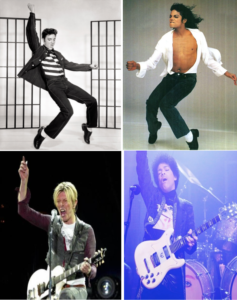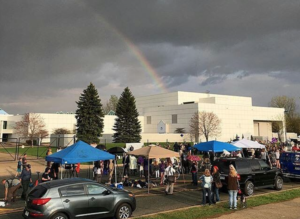 Elvis Presley pioneered the funereal phenomenon of music stars becoming far more marketable in death than they ever were in life. Michael Jackson took this to new heights (or depths depending on your sense and sensibility):
Elvis Presley pioneered the funereal phenomenon of music stars becoming far more marketable in death than they ever were in life. Michael Jackson took this to new heights (or depths depending on your sense and sensibility):
Since the singer died of drug intoxication in 2009 – when he was said to be $500 million in debt – his estate has ballooned to an estimated $1.5 billion, a portion of that from the 50 million albums that have sold posthumously.
(Daily Mail, June 8, 2014)
I duly expressed my cynicism in “More Proof Michael Was Not ‘Gone Too Soon,’” June 20, 2014.
This is not the forum to elaborate on the psychology of people who wait for music stars to die to become their biggest and most devoted fans. But I could not resist commenting on it – in “David Bowie, Gender-Bending Performing Artist, Is Dead,” January 12, 2016 – as follows:
Don’t get me started on his self-professed fans taking to social media to share how much his music meant to them. After all, if just a fraction of them had actually purchased his music, Bowie’s last hit single would not have been “Let’s Dance” … over 30 years ago…
Ironically, apropos of hits, that is bound to change with the timely release, just two days before he died, of Blackstar, his requiem/farewell album. It’s trending; therefore, millions of social-media twits must have it.
 Sure enough, Billboard reported on January 14 that sales of the dead Bowie’s Blackstar eclipsed record-setting sales of the living Adele’s 25, rocketing him to the top of its album chart for the first time … ever.
Sure enough, Billboard reported on January 14 that sales of the dead Bowie’s Blackstar eclipsed record-setting sales of the living Adele’s 25, rocketing him to the top of its album chart for the first time … ever.
Is it any wonder, then, that Prince never enjoyed in life the kind of commercial success he’s now enjoying in death:
Initial sales figures prove that Prince’s influence still reigns — sales spiked a reported 42,000%, according to Nielsen Music…
The tributes, memorials and thoughtful remembrances of Prince will continue for weeks. But now a whole lot more people have Prince songs in their libraries, and that’s one small silver lining in all the sadness.
(Los Angeles Times, April 25, 2016)
The cynicism inherent in such spike in sales is bad enough. That this cynicism seems completely lost on so many is profoundly dismaying. After all, if Prince ever had the influence the Los Angeles Times implies, the “silver lining” in his death would not be “a whole lot of people [suddenly adding] Prince songs to their libraries.”
Mind you, I suspect madding mourners buy memorabilia on these occasions primarily to draw attention to themselves. And there’s never any shortage of hucksters willing to exploit this perverse form of narcissism.
This, from today’s edition of the New York Daily News, betrays the cupidity of the hucksters, as well as the vacuity of the mourners, in this context:
Crafty sellers are looking to the heavens to make purple gains after Prince’s death. Just one week after Prince died, Minnesotans have launched a free-for-all selling spree to profit from the Purple One’s passing.
While most merchandisers stuck to shirts, key chains and posters, endeavoring entrepreneurs were inspired by the ‘Purple Rain’ artist – by literally selling the rain from the day Prince died.
Let me hasten to clarify here that I am an even bigger fan of Prince’s music than Michael’s. Any real fan of both will understand why. But I find it curious that, just as he did in life, Prince is getting a pass in death for manifesting the same symptoms of racial self-hatred that dogged Michael in life and death.
Nothing demonstrates the latter quite like reports a few weeks ago about Twitter trolls taunting his daughter Paris to explain the patent absurdity of claiming a black man as her biological father. I wrote about the inevitability of his children facing taunts and identity crises in “Michael Jackson, the King of Pop, Is Dead,” June 27, 2009, and “MJ: The Kid Is Not My Son (and Neither Is the Girl, or the Other One,” October 23, 2015. But I digress …
 The point is that Prince conveyed (and left behind) mixed messages about his racial pride that are every bit as troubling. He clearly emulated Michael’s efforts to look more white than black. And his song “Controversy” betrays consciousness of guilt in this respect just as surely as Michael’s “Black Or White” does. For the record, the only person who ever created a controversy over whether Prince is black or white was Prince; and, with all due respect to Michael, it actually does matter if you’re black or white.
The point is that Prince conveyed (and left behind) mixed messages about his racial pride that are every bit as troubling. He clearly emulated Michael’s efforts to look more white than black. And his song “Controversy” betrays consciousness of guilt in this respect just as surely as Michael’s “Black Or White” does. For the record, the only person who ever created a controversy over whether Prince is black or white was Prince; and, with all due respect to Michael, it actually does matter if you’re black or white.
But perhaps nothing is more telling than the gallery of Prince’s wives, fiancées and girlfriends. For the blackest of them all was his half-Mexican protégé, Sheila E.
 Meanwhile, bringing my lament full circle, reports are that the intestate beneficiaries of Prince’s estate are already salivating over the prospect of turning his Paisley Park into a tourist trap; you know, like Elvis’s Graceland….
Meanwhile, bringing my lament full circle, reports are that the intestate beneficiaries of Prince’s estate are already salivating over the prospect of turning his Paisley Park into a tourist trap; you know, like Elvis’s Graceland….
As indicated above, one could write a dissertation on this posthumous idol worship, which makes no more sense to me than viral clips about swimming pigs. What irks me most is that it makes a mockery of the respect and support real fans showed singers like Prince while they were still alive. But I shall suffice to end with this question:
Why don’t a whole lot of people suddenly add the films of dead movie stars to their libraries the way they add the songs of dead music stars?
Things that make you go hmmm, no?
Related commentaries:
More proof Michael…
Bowie … dead…